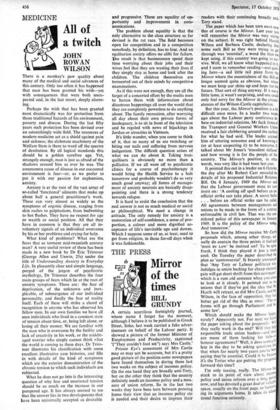MEDICINE
All of a twitch
JOHN ROWAN WILSON
There is a monkey's paw quality about many of the medical and social advances of this century. Only too often it has happened that man has been granted his wish—yet with consequences that were both unex- pected and, in the last resort, deeply alarm- ing.
Perhaps the wish that has been granted most dramatically was for protection from those traditional hazards of his environment, poverty and disease. During the last fifty years such protection has been devised over an astonishingly wide field. The resources of modern medicine act as a shield against pain and sickness; the elaborate machinery of the Welfare State is there to ward off the spectre of destitution. By all logical standards this should be a golden carefree age. Yet, strangely enough, man is just as afraid of the shadows around him as ever he was. The commonest cause of disease in our cocooned environment is fear—or, as we prefer to put it with our passion for euphemism, anxiety.
Anxiety is at the root of the vast array of so-called 'functional' ailments that make up about half a general practitioner's work. These can vary almost as widely as the symptoms of organic disease, ranging from skin rashes to palpitations, from bedwetting to hot flushes. They have no respect for age or wealth or social position. All that they have in common is that they are all in- voluntary signals of an individual overcome by his or her problems and crying for help.
What kind of problems? What are the fears that so torment mid-twentieth century man? A very useful review of these has been made in a new book by Dr Eric Trimmer (George Allen and Unwin, 25s) under the title of Understanding Anxiety in Everyday Life. In pleasantly clear and simple language, purged of the jargon of psychiatric mythology, Dr Trimmer describes the four main groups of fears which lie at the root of anxiety symptoms. These are: the fear of deprivation, of the unknown and inex- plicable, of submergence of our individual personality, and finally the fear of reality itself. Each of these will strike a chord of recognition in anyone who has observed his fellow men. In our own families we have all seen individuals who lived in a constant state of tension about time, or, being left alone, or losing all their money. We are familiar with the man who is overcome by the futility and lack of creativity in his work, or the middle- aged worrier who simply cannot think what the world is coming to these days. Dr Trim- mer illustrates his classification with some excellent illustrative case histories, and fills in with details of the kind of symptoms which are the exterior demonstration of the chronic tension to which such individuals are subjected.
What he does not go into is the interesting question of why fear and emotional tension should be so much on the increase in our pampered age. It has always seemed to me that the answer lies in two developments that have been universally accepted as desirable and progressive. These are equality of op- portunity and improvement in com- munications.
The problem about equality is that the only alternative to the class structure so far devised is the rat race. The field becomes open for competition and in a competition somebody, by definition, has to lose. And an egalitarian society offers no alibi for failure. The result is that businessmen spend their time worrying about their jobs and their wives feel that they are wasting their lives if they simply stay at home and look after the children. The children themselves are tormented out of their minds by competitive examinations.
As if this were not enough, they are all the target of a concerted effort by the media men to harass them with information about disastrous happenings all over the world that they are completely powerless to do anything about. The family recreation, after worrying all day about their own private forms of inadequacy, is to sit in front of the television and be regaled with news of hijackings in Jordan or atrocities in Vietnam.
It's little wonder, when you come to think of it, that so many of us are twitching or biting our nails and suffering from nervous indigestion. The difficult question arises of what we can do about it. Taking tran- quillisers is obviously no more than a palliative. If we all went off to psychiatric clinics for a course of psychotherapy it would bring the Health Service to a halt tomorrow and probably wouldn't do us very much good anyway; all forms of manage- ment of anxiety neurosis are basically disap- pointing and there is a strong tendency towards relapse.
It is hard to resist the conclusion that the real answer is not so much medical or social as philosophical. We need a change in attitude. The only remedy for anxiety is a restoration of self-confidence, a sense of pro- portion, a calmer and more dignified ac- ceptance of life's inevitable ups and downs. Which I suppose some of us, at least, used to get from religion, in those far-off days when it was fashionable.






































 Previous page
Previous page